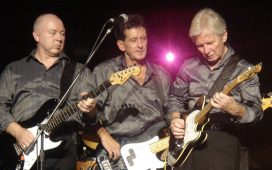
Music is a strong trigger of nostalgia.
Photograph: Clique Images/Stocksy United
Nostalgia. It’s the enemy of progress. After all, how can you move forward with your life if all you’re doing is looking back, living in the past and uttering melancholic sighs of: “Ah, those were the days” as your eyes slowly glaze over? What about these days you’re living right now, and the days after those, and the days after those?
That’s the received wisdom, anyway. But where did it come from? Back in the 17th and 18th centuries, nostalgia was viewed as a medical disease that manifested itself through irregular heartbeats and full-on bouts of weeping among other maladies, and it was attributed to demons – demons! – attacking the middle brain. That might have something to do with it.
Today, while we associate nostalgia with warm, fuzzy feelings related to our childhoods, or other times in our past that were especially happy, it still carries negative connotations in our live-in-the-moment culture. But, we may be looking at this all wrong. At least, that’s what Tim Wildschut, professor of social and personality psychology at the University of Southampton, believes.
“People in a nostalgic mood are more optimistic about their future, and are more inspired to pursue their most important goals,” says Wildschut. “Rather than freezing them in place, nostalgia is very motivational – the past provides a template for what you’d like your future to look like. Maybe you went fishing with your dad, or cycling with your mum. You may develop the goal of having a family yourself and doing those things with your own children.”

Of course, there are many things that can trigger nostalgia. Smells, tastes, photographs, you name it, you’ve probably experienced it. But perhaps one of the most potent is music. “Music is a very strong trigger of nostalgia,” says Wildschut. “We often use it in our studies to induce nostalgia; it’s very effective, very efficient. But it’s important that it’s a personal thing. You really have to look at a person’s individual experiences. It might be a completely obscure Spanish song that they listened to when they were in Spain with friends. To them it’s very nostalgic, but to anyone else it doesn’t mean anything.”
It makes sense then, that the songs we listen to can be markers of significant events in our lives, able to transport us back with all the speed and efficiency of a flux capacitor-equipped DeLorean. For those of us who stream music, the Spotify Wrapped feature is an opportunity, at the end of each year, to relive those moments triggered by certain songs. And with this year marking a decade of Wrapped, that’s potentially 10 years of memories waiting to be rediscovered.
As it turns out, hearing certain music picks me up and deposits me right into London in 2010. This music wasn’t topping charts, or indicative of the era to many, but it remains powerful to me because it represents a time in my life when I felt a real sense of community and belonging – perhaps the first time since I’d left college to go to university.
Looking back, London in 2010 was an exhilarating place to be if you loved bass, beat and hip-hop music, which I did. It had been a couple of years since Flying Lotus (AKA Steven Ellison) dropped his breakthrough album Los Angeles on Warp Records, and the LA beat scene was expanding at a rapid pace – thanks in part to Lotus’ own Brainfeeder label, the Alpha Pup Records, and the exposure provided courtesy of British-based DJs Mary Anne Hobbs, Benji B and Gilles Peterson. And in Britain itself, producers such as Hudson Mohawke and Rustie – both hailing from Glasgow – were pushing their own hyperkinetic style of beat music to equally hyper audiences.
At the time, I was editing a music blog I’d created with friends, and we were fully invested in the beat scene – partying at the Brainfeeder takeover of Fabric, getting sweaty and dancing until the early hours in east London warehouse spaces to a soundtrack of beats and basslines both wigged-out and dreamy. (Yes, I have tinnitus.) Everywhere we went, there were people we knew and enjoyed connecting with. It was like Cheers, but in clubs.
I live in Cornwall now, married with two kids – but play me Double Fifths by Teebs, or Coat of Arms by Nosaj Thing, and that powerful sense of community I had nearly 10 years ago rushes right back. And while I haven’t yet found that same feeling of belonging in the south-west that I had back in London, like Wildschut says, the nostalgia I feel when I listen to these tracks doesn’t make me feel anxious, or even sad. Instead, I feel encouraged to seek out that local community – whether it’s based on music or not – with more vigour, and more verve, because, well, I want that feeling again. Ah, those were the days.
To celebrate the end of the decade, Spotify is unlocking 10 years of your streaming data. Get your Wrapped now and relive the music that mattered to you.













